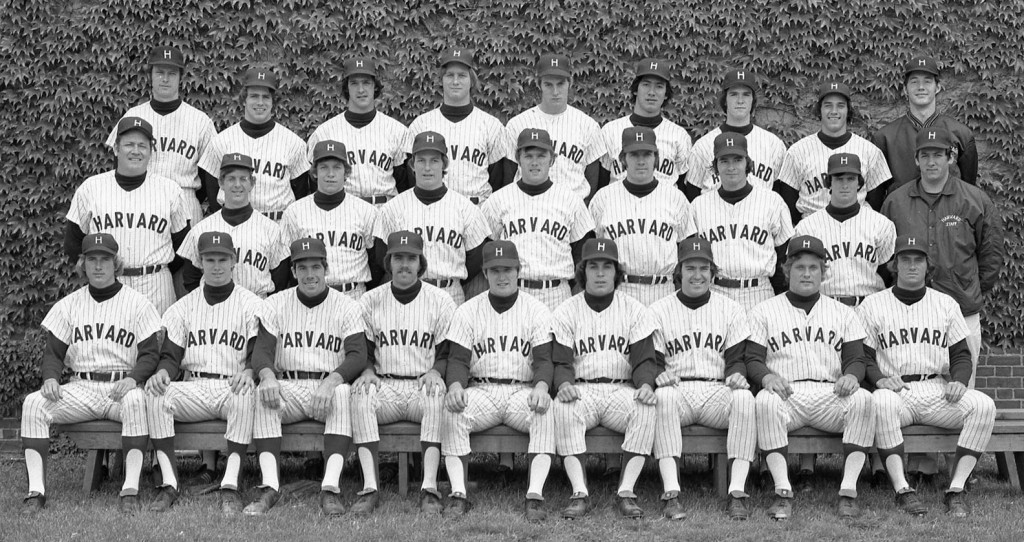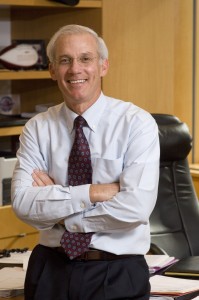Fast Break: Durso on his CWS days

Harvard’s 1973 baseball team: SS Ed Durso is pictured second from right in top row.
Ed Durso knows that his name might not resonate with most sports fans, even those fanatic about college baseball.
“For the trivia question, ‘Which ESPN employees played in the College World Series?’, most people probably would not guess my name,” said Durso, the company’s Executive Vice President, Administration.
“They’d figure out [ESPN analyst and former Minnesota Gophers star Dave] Winfield right away.”
Recently, Front Row featured a post on ESPN Associate Producer Seth Miller, who had his star turn in the 2002 CWS as a Clemson Tiger. And as detailed in that post, Miller is one of several ESPN employees with Omaha playing experience.
In 1973 and ’74, Durso helped power Harvard to consecutive CWS appearances. The Crimson lost to national powers USC and Miami, respectively.
Durso, an All-Ivy League shortstop, cherishes the chances he had to compete for a national title.
Durso joined ESPN in 1989 as senior vice president/general counsel after spending 10 years working in the Office of the Commissioner of Major League Baseball. Former commissioner Peter Ueberroth once championed Durso as an ideal candidate for the job.
As South Carolina beat Florida for the 2011 CWS title, Durso spoke to Front Row about his memories of those Harvard teams, his skills as a shortstop, and his ESPN career.
FR: What are your prime memories of playing in the College World Series?
Durso: It was a terrific group of guys, they just enjoyed playing. At that time, the tournament was structured differently than it is today. In the regional tournament we only played teams from New England, New York and Pennsylvania. The districts were geographically aligned. We didn’t get seeded around like they do today. An interesting thing was that many of us played two sports. Guys played hockey, soccer, and football. It was an age when you could do that. That group of players still gets together periodically, we stay in touch. It was great to be out there, USC one year, Miami one year. To play against those kinds of programs was a lot of fun. Unfortunately this was a time when ESPN didn’t exist, ’73-74. My parents couldn’t afford to make the trip. They were not able to watch it, which was too bad.
FR: Did any of the guys you played against make the majors?
Durso: In 1973, I believe that USC had Steve Kemp at first base, Rich Dauer played second base, Roy Smalley played shortstop, and Fred Lynn was the centerfielder. Maury Wills’ son played for Arizona State that year, Bump Wills. Dave Winfield played for Minnesota that year, pitched and played the outfield. In the New England tournament leading up to the World Series, we beat [future Cy Young winner] Mike Flanagan in Fenway Park. He pitched for UMass.
It was the most exciting game I think I’ve ever played in. Our third baseman, Jim Stoeckel, hit a home run over the Green Monster off Flanagan to help win the game. He actually ended up playing pro football in Canada but we did not have anybody from those Harvard teams who made it to the major leagues.
FR: How would you describe your game?
Durso: I played pretty well. I made all-Boston, all-Ivy League teams. I had a great sophomore season, just missed winning the Ivy League batting title by one hit. I played shortstop, but was really a second baseman. I moved over.
I started every game in my three years. In the 70’s, freshmen did not play varsity.
FR: Is there a modern equivalent, someone whose game resembles yours?
Durso: I wasn’t good enough to compare to any pro. I was a solid player, I got on base a lot, batted first, held the runs scored record at school for a while, and had a good on-base percentage.
In a precursor to Moneyball,, there was an award given to what they called “the most effective man at bat,” which essentially was who had the highest on-base percentage. I won that the 3 years I played varsity.
FR: Were you a two-sport athlete too?
Durso: I played football two years, ended up getting hurt. I was a running back in college. I was a quarterback in high school but they had a lot of good quarterbacks.
FR: Have you gone back to Omaha for the CWS?
Durso: I have not gone back and probably should have. It’s a great tournament, they do a great job.
FR: When you came to ESPN from MLB, what attracted you to ESPN?
Durso: I had been working with the folks at ESPN before. I was on the other side of the coin when we sold the first big cable package for MLB, ESPN got those rights. A couple of months later, Roger Werner called me up and asked me if I was interested in moving over, because they were looking for a new general counsel. For me, it was a good moment in time to think about a career change so I decided to join the company. Very happy I did. I remember distinctly reaching out to Dan Burke, who was then the president of ABC and asking Dan if he thought that would be a good move, to come to ESPN. It was then 1989. He thought ESPN was in good shape and was ready to make a run. At the time I joined the company, there were maybe 400 or so employees. We were just beginning to move out into international markets. The rest is history from the standpoint of how much growth we’ve witnessed. It’s great to be a part of all of that.
FR: How do you handle that challenge, watching a company grow from about 400 employees to more than 6,500?
Durso: It’s been gradual, obviously, over 20-plus years. One of the biggest challenges is trying to communicate effectively with a larger group of employees. As it gets bigger, it gets more difficult to do that.
I think maintaining our commitment to quality product has been the secret to everything we’ve done. We take nothing for granted. The most important things are to maintain a clear sense of direction for the business and not to assume, ever, that we have some kind of given right to exist. One way or the other, we should always be cognizant of the competition and never take for granted what we have. And I don’t feel that we have.
FR: Putting on your Human Resources hat, what’s one aspect of ESPN’s environment that you think would surprise people?
Durso: I would say most people would be surprised by the breadth of the work that we do. When you’re part of ESPN, you have an opportunity to touch a lot of different modes of distribution and contribute in a lot of ways to areas that might not be inside the four corners of your job description. We look to take full advantage of the capacity and the experience of the people who are here. Allow everyone to contribute. I have always been impressed by the overall humility of our people. Every day, they try to do better than the day before. That attitude is one of our key drivers.
FR: What was it like working for Major League Baseball during the Pete Rose gambling investigation?
Durso: It was sad. I say that because it is never fun to be working on something that’s troublesome and from a baseball perspective, nothing could be more of a problem than the notion that there was gambling on games. The commissioner’s office was established by a gambling scandal, and there’s really one rule in baseball. The one rule is, don’t bet on games. It was distressing in that regard. I was involved in the beginning of the case and the decision to take him out of the game was actually was made after I left. I’d say we wanted to make sure that we did the best job we possibly could and give Rose every opportunity to let us know what was going on. He chose to do what he chose to do.
FR: Years ago there were reports that you’d be considered an ideal candidate as baseball commissioner. Has that job ever intrigued you?
Durso: I’m flattered that someone might think that. If an opportunity like that ever presented itself, you’d be crazy not to consider it. I love baseball, played it, worked there. It’s still my favorite sport. But this has been a great run here and I don’t expect it to end anytime soon. Besides, [ESPN Radio host] Mike Greenberg clearly wants the job and that is tough competition. I think he’d get the nod.







